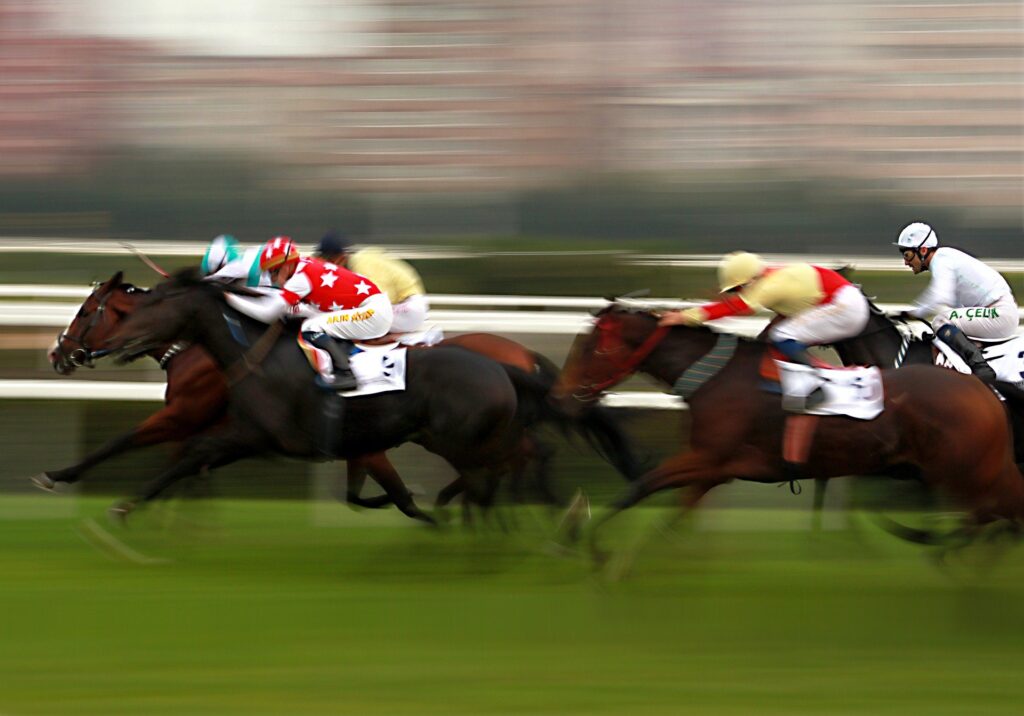
“Hasn’t this leftover of the capitalist elite run yet?” my husband asked as he passed the television set, me leaning forward, legs demurely folded to one side, mint julep in one hand.
“Post time is later this year,” I informed him. “And don’t ruin it.”
This exchange took place two weeks ago. Medina Spirit upset the odds and won the Kentucky Derby, so there are no spoilers possible. I was happy to see the beautiful run of that “little race horse,” as controversial trainer Bob Baffert rather patronizingly called his winner. Then news of the doping broke, and Medina had to let go of the roses. I am trying to let go, too—of the annual marital (and internal) debate.
Fox hunts are a relic of the British country squire’s life, polo is the sport of kings, and horse racing is oiled with White or Saudi money. The traditions of the Derby were forged in the antebellum years, when being Black in the South was dangerous (oh wait, it still is). The idea came from the Old (White) World, when Meriwether Lewis Clark, grandson of explorer William Clark, was inspired by England’s Epsom Derby and France’s Grand Prix de Paris Longchamps.
“Look, honey, there’s a Black woman there,” Andrew said, the sarcasm hanging between us as the camera lingered on her. I scanned the crowd, hoping to argue, but as usual, most of that pastel haberdashery sat on the straighter, limper hair of White women. In defense of diversity, I could always point out the Black and Latinx jockeys who took the real risks and did the real work of the race. But the winning jockey, Johnny Velazquez, walked away with only ten percent of the purse.
That is reasonable, I suppose; Velazquez took none of the financial risk the owner takes, and he gets to do the work he loves. But in those famous two minutes, make no mistake, it is the jockey who owns that horse’s spirit. They ride as one, communicate with the slightest pressure or veer, share the speed and sweat and exhilaration. If somebody else’s money makes that possible, I say, so be it. But my husband, who has never come under the spell of a horse race, sees the inequities, the risks of doping or overstressing those gorgeous animals, the wheeling deals, and ruined lives. For him, all that outweighs the thrill of those galloping hooves, the tossed head of a horse eager to run, the way his muscles gather and bunch and then, sprung, extend nearly horizontal. These horses are all in, propelled by instinct and training and somebody else’s ambition. Done right, it is the consummate human-animal partnership. Why does money have to ruin everything it touches, I want to wail. And why must money always be dangled to perpetuate tradition?
There is nothing like the buildup to the Derby. Watching the horses walk, reading about them, picking your favorite, hearing the gossip, critiquing the ladies’ hats (gender is not fluid at the Derby)…. From tv distance, the crowd looked like a Seurat painting, pointillist colors daubed on delicately, the picture shifting as women leaned, nodded, embraced. Sitting on the couch in jeans and a sweatshirt, I sipped bourbon and mint through crushed ice in my grandmother’s chilled silver cup and tasted the South, the white stacked stone walls and emerald grass, the agreed-upon pleasures, and courtesies. All this ceremony and high-stakes suspense for two minutes? I loved that we deemed it worthwhile.
“You do realize today is May Day?” my Bolshevik husband asked wryly.
“Plenty of well-paid work is created by this race,” I retorted. A jockey licked the nerves from his lips and leaned closer to his horse’s neck; you could feel the connection. I inched forward on the couch, eager for the moment when they explode from the gate. “Riders up!” came the call, and I watched another jockey’s easy loft into the saddle. The bugle sounded, high and clear, and the strains of “My Old Kentucky Home” filled our kitchen, soothing my excited heart and promising continuity.
Andrew did not even have to say the words. Continuity of what?
Of the whole muddle, I supposed. Like most shared public rituals, this one is a tangle of history, baggage, and ideals. I sighed and let the song distract me, its slow, deliberate melody at sharp odds with the yearned for speed of the race.
The lyrics of “My Old Kentucky Home” are innocuous—but I looked them up later and found they were penned by Stephen Foster as a minstrel song and likely inspired by Uncle Tom’s Cabin. Frederick Douglass felt the song might help “antislavery principles take root, grow, and flourish.” But it was sung in blackface, and its sentimentality softened and romanticized the ways of the Old South, so how could that help?
America’s oldest sport carries trappings of America’s oldest problems. So does my life, with its ambivalence toward wealth, hating its injustice and excess but craving its—what? Elegance? You can be elegant in rustic simplicity, and a steeplechase in a park might be just as exciting if I knew the horses and the obstacles. Is it the politeness of these rituals that enchants me, with their insistence on the traditions of civility? That can be found in the poorest village church or square. Everything I associate with money can be got without it, except a spectacle of this size, with these stakes and this much shared attention. There is refinement here—like pure white, sparkling sugar or soft flour, that extra processing that makes things delicious and easy to digest but takes away the raw flavor and health, and ultimately messes up our insides.
Knowing this, I still eat pastry, and next year, I will still watch the Derby, and love the horses, and hate the cruelty of luck and greed, and worry about my soul.
Read more by Jeannette Cooperman here.
